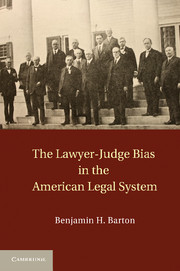Book contents
- Frontmatter
- Contents
- Acknowledgments
- 1 An Ambient Bias
- 2 The Theory
- 3 Constitutional Criminal Procedure
- 4 Civil Constitutional Law
- 5 A Short History of Lawyer Regulation
- 6 Current Lawyer Regulation
- 7 Torts
- 8 Evidence and Civil Procedure
- 9 The Business of Law
- 10 Enron's Sole Survivors
- 11 Complexity and the Lawyer–Judge Bias
- 12 Rays of Hope, Ramifications, and Possible Solutions
- Index
- References
11 - Complexity and the Lawyer–Judge Bias
Published online by Cambridge University Press: 03 May 2011
- Frontmatter
- Contents
- Acknowledgments
- 1 An Ambient Bias
- 2 The Theory
- 3 Constitutional Criminal Procedure
- 4 Civil Constitutional Law
- 5 A Short History of Lawyer Regulation
- 6 Current Lawyer Regulation
- 7 Torts
- 8 Evidence and Civil Procedure
- 9 The Business of Law
- 10 Enron's Sole Survivors
- 11 Complexity and the Lawyer–Judge Bias
- 12 Rays of Hope, Ramifications, and Possible Solutions
- Index
- References
Summary
The broadest judicial bias I see … is the bias in favor of legal complexity. The volumes of the third edition of the Federal Reporter spread themselves like Kudzu vine over the shelves of law libraries.
– Dennis Jacobs, Chief Judge, U.S. Court of Appeals for the Second CircuitThe multiplication of rules and standards, carrying in its train as it does endless debate over boundaries, is one of the banes of the American legal system, a source of its appalling complexity.
– Holmes v. BussEARLIER CHAPTERS OFFER MULTIPLE EXAMPLES OF THE lawyer–judge bias in case law. Chapter 10 discusses Enron as a recent real-world example of the way in which the lawyer–judge bias has important and deleterious consequences. In this chapter, we consider a more diffuse, but equally insidious, consequence of the lawyer–judge bias: how the lawyer–judge interrelation leads to the overweening legal complexity described by the judges at the start of this chapter.
Before defining legal complexity, let me start with a caveat. I have presented parts of this book at law schools and conferences all over the country and I have had multiple colleagues read it in draft. This chapter is invariably their least favorite. Law professors, judges, and lawyers have a very hard time seeing what seems obvious to outsiders – the American legal system is hopelessly and miserably complex and much more complicated than it needs to be.
- Type
- Chapter
- Information
- The Lawyer-Judge Bias in the American Legal System , pp. 259 - 284Publisher: Cambridge University PressPrint publication year: 2010
References
- 1
- Cited by



